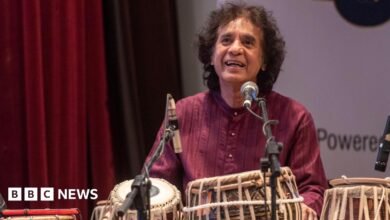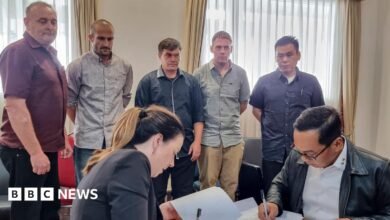What it’s like to flee Jenin’s ‘earthquake’ incursion by Israeli forces | Israel-Palestine conflict

Standing outside her home in the occupied West Bank’s Jenin refugee camp, Saja Bawaqneh found herself in a familiar spot – the same one where her father had been shot and killed by Israeli forces a few years earlier.
This time, she was waiting for an Israeli army officer to signal that it was time for her to begin walking towards the city’s main hospital after she had been forced out of her home, five days after Israeli soldiers – backed by helicopters and drones – launched a 10-day incursion into Jenin.
It was 1am, and she was with her 60-year-old mother, her two sisters, her pregnant sister-in-law and her young niece and nephew.
Apart from a small bag with the children’s essentials, they had nothing but the clothes on their backs.
It was not the first time the Bawaqneh family home had been raided, nor was it the first time the camp had come under attack. But this latest incursion, which began nearly a week ago and lasted until Israeli forces withdrew on Friday, has been the most intense; dubbed an “earthquake” by the city’s residents.
At least 34 Palestinians have been killed during this latest operation, which also targeted Tulkarem and other areas of the northern West Bank, in conjunction with Israel’s ongoing assault on the besieged and bombarded Gaza Strip.
Israeli army bulldozers have torn apart large swaths of Jenin, which remained under siege for more than a week, razing entire streets and structures. Even though Israeli army soldiers have since withdrawn, residents fear soldiers will return after temporarily moving to surrounding military checkpoints.
“It usually takes us 10 minutes to reach the hospital on foot, but because we were walking slowly, with our hands up in the air, and the streets were damaged – it took us much longer,” Bawaqneh, 29, told Al Jazeera.
Besieged, then displaced
Bawaqneh and six other members of her family had been hiding in their kitchen ever since the incursion began on August 28. It was the safest spot in their four-storey home in the heart of Jenin refugee camp, away from large windows and from Israeli snipers stationed outside.
Unable to leave, they were rationing food, water and medicine while trapped in their home.
Five days into the raid, a group of Israeli army soldiers came barging in after spending an hour firing live bullets towards the house and its surroundings.
“During the gunfire, we were crammed in a corner of our kitchen, stacked on top of each other,” Bawaqneh said, describing the gunfire as “loud and excessive”.
“We could hear sounds of explosions and people screaming,” she said.
They were all tense, trying to picture and prepare for every possible scenario that would follow this entry into the house.
“We made sure the children were dressed and their shoes were on. We told them we were about to leave because we anticipated they would barge in at any moment,” Bawaqneh said.
“They were scared and held tightly onto us. Their legs were shaking so much so that they couldn’t walk,” she said.
When they came into the house at about 10pm, they arrived “in unbelievable numbers, and began searching every room with dogs”, Bawaqneh recalled.
“They came with water and food, enough to last days,” she said, adding that it was clear they were going to use the house as a “military base”.
About three hours later, they were confronted by an Israeli army officer who ordered them to leave. Bawaqneh refused, and said it was too unsafe for the children because the streets were wrecked and without power.
“He told us, ‘we’re going to have to lock you in a room’. And that’s exactly what they did after confiscating our phones,” Bawaqneh recalled.
Sitting in a room adjacent to the main hall of the house, the women were all wondering how long they were going to be locked in for.
Some 45 minutes later, another soldier unlocked the door and told the family to leave.
“I asked again if they could guarantee our safety walking alone, in the dark, and the officer said yes. So of course, we had no choice,” she said.
“We left, and they didn’t let us take a single thing with us. We had no food, no water, no clothes, no money.”
Upon arriving at the Jenin Government Hospital, Bawaqneh quickly realised that their situation was similar to many other families who had also been forced to leave their homes and who ended up in the hospital.
There was no way of knowing what was going on as power cuts and the lack of internet access made it difficult to keep up with what was happening across the camp and the eastern part of Jenin city.
A city ‘annihilated’
According to Bawaqneh, “terrified” families she encountered at the hospital had also fled “without anything, not even a penny in their pockets”.
“Those who arrived before us were sleeping in the maternity ward upstairs,” Bawaqneh said.
She said it was “rare to see a whole family together”, as many young people and children – especially young men who are prone to abuse and arrests by Israeli soldiers – fled the camp to nearby areas when the operation began.
As the sun came up, people started arriving in large numbers and families were “filling up the courtyard” of the hospital, Bawaqneh said.
Rights groups including Amnesty International have warned that with these incursions, forced displacement is inevitable.
Amnesty also noted that there has been a “horrifying spike” in lethal force by Israeli forces against Palestinians in the West Bank.
The head of Jenin’s municipality, Nidal al-Obaidi, agreed.
“Raids and incursions have been happening for several years, but they have increased in frequency and intensity following October 7 – and so has the destruction that comes along with each incursion,” al-Obaidi told Al Jazeera.
He described the latest incursion as “an earthquake” that shook Jenin and its refugee camp.

“We’re seeing army bulldozers sweep the city’s streets, destroying infrastructure, water pipes and sewage systems. We’re seeing gunfire being directed towards phone and electricity lines,” al-Obaidi said.
“We’re seeing the destruction of public facilities including schools, playgrounds and businesses. And of course the destruction of many, many homes – either completely or partially,” he added.
About 70 percent of Jenin has been “annihilated”, said al-Obaidi.
According to him, families in about 120 homes have been forced to flee. Many homes have been either partially or completely destroyed.
Bawaqneh’s home is one of them. Upon returning to check on their family home on Friday, Bawaqneh said Israeli army soldiers had “turned the house upside down” after vandalising it beyond recognition.
The main door is broken, windows in the house are shattered, furniture including beds are also broken. Israeli soldiers drew on the walls and on pictures of Bawaqneh’s slain father.
“Every corner of the house has been trashed. Our kitchen appliances have been used and abused. It will take weeks to make this space liveable again,” she said.
Some family homes have suffered even worse. Al-Obaidi said “dozens of homes have been razed to the ground”.
More than 100 shops and businesses have been destroyed, especially those in Jenin’s commercial square.
Videos verified by Al Jazeera’s fact-checking agency, Sanad, show Israeli army bulldozers destroying local businesses and residential structures in Jenin.
Al-Obaidi said the municipality is working to repair some of the water pipes and power lines in certain areas, especially those close to the hospital.
But, it has been “extremely challenging with the heavy presence of Israeli forces, who have fired towards my car personally, and at the electricity trucks”, al-Obaidi said.
Unable to leave
The Palestinian Red Crescent Society (PRCS) said its teams were also facing difficulties responding to people trapped in Jenin and its refugee camp as Israeli forces obstructed their movement. Many were running low on food, water, baby formula and other essentials.
Israeli soldiers have cornered off the commercial square in the heart of the camp and have declared it a “closed military zone”, local journalist Eman Silawy told Al Jazeera.
Local journalists Al Jazeera spoke to say only a fraction of the camp’s 12,000 residents were able to flee since the operation began. Those who fled went to areas on the outskirts of the city, or to areas of the camp that are far from where confrontations were centred.
While dozens in the eastern part of the camp, including in the main ad-Damj neighbourhood, have been forced out by Israeli soldiers, “thousands of other families have stayed in the camp”, Silawy said.
This is because they were either unable to leave safely, or simply do not have the means to do so, she said.
‘We are losing hope’
Israeli attacks on Jenin are hardly new.
Jenin has been a focal point for Israeli military incursions many times before, ever since the second Intifada that erupted in the year 2000.
During these assaults, Israeli forces often destroy entire neighbourhoods, claiming they are harbouring Palestinian fighters.
Even without these incursions, conditions in the camp are desperate, aid workers say. The unemployment rate is high and poverty is rampant, according to the United Nations.
Despite the many challenges ahead, al-Obaidi said Jenin’s residents have always been “steadfast” in the face of Israeli “aggression”.
Like many others, Bawaqneh said she has hope that her family will return to their home once it is restored. It had been used by Israeli soldiers as a “base” when they left, she said, adding that she was shocked, but not surprised by the extend of “intentional damage” inflicted on their home and belongings.
“We are very, very tired,” she said. The family, now sheltering in a temporary home on the outskirts of Jenin, will have to once again repair major damages and pay from their own savings to do so.
“The scale of destruction, loss and fear of the unknown is what I most worry about,” she said. “We are losing hope of resuming anything that resembles normal life because the camp does not receive any sort of support.”
Source link



